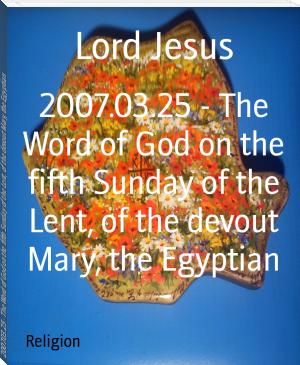The Mistakes of Jesus - William Floyd (warren buffett book recommendations .TXT) 📗

- Author: William Floyd
- Performer: -
Book online «The Mistakes of Jesus - William Floyd (warren buffett book recommendations .TXT) 📗». Author William Floyd
"Whosoever shall blaspheme against the Holy Ghost hath never forgiveness, but is in danger of eternal damnation."[25]
"Except ye repent ye shall perish."[26]
"If thy hand offend thee, cut it off: it is better for thee to enter into life maimed, than having two hands to go into hell, into the fire that never shall be quenched."[27]
"How can ye escape the damnation of hell?"[28]
"He that believeth and is baptized shall be saved, but he that believeth not shall be damned."[29]
It is evident from these quotations that Jesus not only preached belief in his divinity as essential to salvation, but endeavored to terrify people into belief by threats of eternal torment. Jesus was responsible for the theological conception of a fiery hell. If he was mistaken, if there never was a place of torment for the wicked after death, is it not an act of constructive criticism to expose the person most responsible for the false doctrine that has caused so much fear and mental suffering? Must we not deplore this mistake of Jesus and recast our entire opinion of him as a religious teacher?
Are we not justified in stating positively that Jesus made a mistake when he taught a physical hell and condemned people to spend eternity in torment for the doubtful sin of disbelief?
The Atonement
The doctrine of the Atonement was taught by Jesus. "For this is my blood of the new testament, which is shed for many for the remission of sins."[30]
Whether this sacrifice of the innocent Jesus to save sinful man was ordered by God or was voluntary on the part of Jesus, it represents a theory of reprieve from punishment long since abandoned as unethical. If sin must be punished, there is no justice in relieving the sinner and placing the burden upon the righteous.
Moreover, the Atonement appears to have been ineffective, for in spite of the sacrifice that Jesus made, few were to be saved under his scheme of salvation. "Many are called but few are chosen."[31] "Strait is the gate, and narrow is the way, which leadeth unto life, and few there be that find it."[32] "Strive to enter in at the strait gate: for many, I say unto you, will seek to enter in, and shall not be able."[33]
If the theory of Atonement for sin by the sacrifice of the innocent was not ethical and if Jesus taught that doctrine, he was in error, was he not?
The sacrifice of Jesus was not so great as often made by men. Jesus was sustained with the thought that he was saving the world; his physical suffering was not long continued; on the night of his crucifixion he was in paradise.[34] He endured a few hours of pain compared to weeks of suffering by wounded soldiers, or years spent in prison by the proponents of an ideal.
Jesus not only claimed the power to remit sins but also said to his disciples: "Whosoever sins ye remit, they are remitted unto them; and whosoever sins ye retain, they are retained."[35]
Is that true? Surely it is proper to ask that blunt question. Here is a definite statement concerning the power of certain men to remit sins. If those men did not have the power deputed to them, must we not doubt the accuracy of Jesus?
Jesus made a distinction between himself and the Comforter: "It is expedient for you that I go away: for if I go not away, the Comforter will not come unto you; but if I depart I will send him unto you ... And I will pray the Father, and he shall give you another Comforter, that he may abide with you forever."[36]
It must surprise some Christians that the Comforter could not be present at the same time with Jesus.
Angels and Devils
Jesus believed in angels and devils, often referring to these imaginary supernatural beings as if they existed. "Thinkest thou that I cannot now pray to my Father and he shall presently give me more than twelve legions of angels?"[37] "So shall it be at the end of the world: the angels shall come forth."[38]
The devils were among the first to recognize Christ's divinity: "What have we to do with thee, Jesus, thou Son of God?"[39] "Let us alone, thou Jesus of Nazareth; art thou come to destroy us? I know thee, who thou art, the Holy One of God."[40] "And unclean spirits when they saw him, fell down before him, and cried, saying, Thou art the Son of God."[41]
Jesus believed in demoniacal possession, casting out devils on several occasions.
Jesus frequently referred to heaven as a place above the earth: "And then shall they see the Son of man coming in the clouds with great power and glory."[42] "And ye shall see the Son of man sitting on the right hand of power, and coming in the clouds of heaven."[43] "Verily, verily, I say unto you, hereafter ye shall see heaven open, and the angels of God ascending and descending on the Son of man."[44]
When Jesus was transfigured and talked with Moses and Elias, he charged his disciples, saying, "Tell the vision to no man, until the Son of man be risen again from the dead."[45]
According to the creeds based upon the Bible, Jesus rose from the dead, descended into hell, and ascended bodily into heaven. According to the gospels he stilled the storm, walked on the water and told Peter to do so and to find money in a fish's mouth and catch a large draught of fishes. These and other miracles connected Jesus with God and were part of his theology.
Every fair-minded person should re-read the gospels and refresh his memory regarding the theology of Jesus. Then a decision must be reached as to the correctness of the views expressed. Either conditions on earth were different in the first century from those of the twentieth, or Jesus was mistaken in his conception of God, heaven, hell, angels, devils and himself.
[1] Matt. i; Luke iii.
[2] Luke ii, 22.
[3] John x, 30.
[4] Matt. xi, 27.
[5] Ezek. xiv, 9; Num. xiv, 30-34.
[6] Ex. iii, 21-22.
[7] Deut. xiv, 21.
[8] Num. xxxi et al.
[9] Ex. xxxii, 27.
[10] Deut. vii, 16 et al.
[11] Jer. xix, 9 et al.
[12] Ex. xxii, 18.
[13] Lev. xxv, 44-46.
[14] Deut. xxi, 18-21; xiii, 6-9.
[15] Lev. i, 14-15.
[16] See the Old Testament.
[17] Luke iv, 16.
[18] Matt. xxvi, 63-64.
[19] Mark xv, 61-62.
[20] Luke xxii, 70.
[21] John iv, 25-26.
[22] John iii, 16.
[23] John viii, 24.
[24] Matt. xxv, 31-46.
[25] Mark iii, 29.
[26] Luke xiii, 3.
[27] Mark ix, 43.
[28] Matt. xxiii, 33.
[29] Mark xvi, 16.
[30] Matt. xxvi, 28.
[31] Matt. xxii, 14.
[32] Matt. vii, 14.
[33] Luke xiii, 24.
[34] Luke xxiii, 43.
[35] John xx, 23.
[36] John xiv, 16.
[37] Matt. xxvi, 53.
[38] Matt. xiii, 49.
[39] Matt. viii, 29.
[40] Luke iv, 34.
[41] Mark iii, 11.
[42] Mark xiii, 26.
[43] Mark xiv, 62.
[44] John i, 51.
[45] Matt. xvii, 9.
FALSE IMPRESSIONSJesus not only held mistaken ideas about theology, as anyone but a Fundamentalist must admit, but he often gave impressions about earthly affairs that were unreliable to say the least. Occasionally his statements were actual misrepresentations of fact.
Jonah and the Whale
"For as Jonas was three days and three nights in the whale's belly; so shall the Son of man be three days and three nights in the heart of the earth."[1]
Evidently Jesus believed the story of Jonah and the whale, as well as the tale of Noah's ark[2] both of which are now generally discredited. Moreover, his prophecy regarding his entombment was inaccurate, for he was only two nights and one day in the heart of the earth, from Friday night to Sunday morning.
End of the World
Jesus was decidedly mistaken in his theory of the approaching end of the world.
"Repent: for the kingdom of heaven is at hand."[3] "Ye shall not have gone over the cities of Israel, till the Son of man be come."[4] "There be some standing here which shall not taste of death, till they see the Son of man coming in his kingdom."[5] "And this gospel of the kingdom shall be preached in all the world for a witness unto all nations; and then shall the end come ... Verily I say unto you, This generation shall not pass, till all these things be fulfilled."[6] "The time is fulfilled, and the kingdom of God is at hand."[7] "So ye in like manner, when ye shall see these things come to pass, know that it is nigh, even at the doors. Verily I say unto you, that this generation shall not pass, till all these things be done."[8] "The hour is coming, in the which all that are in the graves shall hear his voice, and shall come forth; they that have done good, unto the resurrection of life; and they that have done evil, unto the resurrection of damnation."[9]
Jesus was confident that the day of judgment was coming in the first century, but it has not come yet, nineteen hundred years later. This erroneous belief in the imminent end of the world had an important bearing upon his entire philosophy; for if the end of the world was so near it was far more important to prepare for life hereafter than to be concerned over mundane affairs. May we not view with doubt





Comments (0)